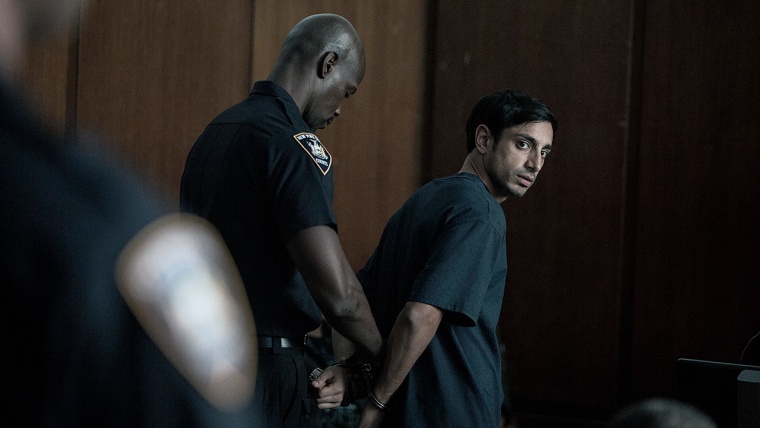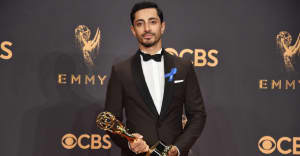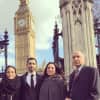 Courtesy HBO
Courtesy HBO
There's a lot to talk about with British actor and musician Riz Ahmed this year: His lead turn as Nasir Khan in the HBO miniseries The Night Of, which ends its maddeningly cunning eight-episode run this weekend, or high profile roles in Jason Bourne and the upcoming Rogue One: A Star Wars Story. There is even music, which Ahmed has made (as Riz MC) in tandem with his 10-year acting career. Earlier this year he released an incisive political polemic-cum-mixtape called Englistan, and this fall a renewed project with NY rapper Heems culminates in a new Swet Shop Boys LP, Cashmere.
But, as is often the case when two creatively-minded brown people from big cities who care about what it means to represent creatively-minded brown people living in big cities come together, the topic invariably turns to just that. Ahmed revealed that despite the UK being “at the forefront, in many ways, of multiculturalism,” British actors like himself, Idris Elba, and David Oyelowo have been getting much of their acting work (including his own breakout role in 2014’s Nightcrawler) from the US. More often than not he's playing young Muslim men — whether in a British context like 2010’s quirky Four Lions or American, as in 2012’s The Reluctant Fundamentalist — but Ahmed is quick to point out that his work is bringing nuance to what it means to be a young, brown, Muslim man living in a post-9/11 world. What is universal, what we bond over, and what Ahmed describes as the healing nature of his creative work, is uncovering the unique tensions that people feel when they’re from neither here or there.
RIZ AHMED: Once I got the role for The Night Of I kind of approached it like any character, which is you try to build that person from the ground up. So I went to New York for a couple of weeks in 2012 and tried to explore Queens — that’s how I ended up linking up with Heems. I spent some time there with youth groups, like SAYA (South Asian Youth Action). I went to high schools and community colleges in Queens and the Bronx. I wanted the associations in my head to trigger slightly different things. Me, Riz from London, if I see a yellow cab I’m like, 'Oh yeah, that’s that thing from the opening credits of Friends, right?’ but if you’re Nasir you should be thinking, That’s dad’s job. We don’t see them around Queens, we see them in Manhattan, which is this other place and I don’t spend much time there. As an actor you rearrange the furniture in your mind a bit, so that it looks how the character might see it. I also went to Rikers, spoke to criminal defense lawyers, people who have just come out of prison. On paper you’d think, Oh working-class Pakistani character, it’s the same background! But it’s completely different. I’ve had a completely different life to that guy, and growing up in Queens is totally different to growing up in Wembley. You have to respect the specificity of that.
The Night Of was adapted from a British TV show, where my character was played by a white actor. The thought that went into [the adaptation] was that if the character was a cab driver in New York he’d probably be Pakistani or West African. A big agenda can be debilitating, but [screenwriter] Richard Price is a New York City writer and he knows human beings. When you get detail and nuance these stories will explore bigger ideas. Like, in the show, they talk about the tensions between the Sunni Muslims and the Nation of Islam in prison, and it’s interesting because it adds to the humanization of people and communities that are often not visible. Contradictions and conflict is what humanizes us.
When I started out as an actor there was some type of post-9/11 gold rush in terms of storytelling, and I just wasn’t interested in it. That’s why I made a song called “Post 9/11 Blues” about that circle of fear. I was interested in doing projects that gave nuance to the discourse at that time, which was frustratingly two-dimensional. It feels like those stories are being told a bit less now. At that time that was the only kind of thing you could get seen for — that was the only shelf space we had, as product. That’s opened up for sure. But also, talking about this in terms of linear progress doesn’t make sense, because in the ’90s there were a lot more people that looked like me on TV. Black and minority ethnic representation on UK television is at one of the lowest points in a decade. You’ll see a lot of people of color reading the news on the BBC but our visibility in drama and storytelling is quite low, but then I feel like we’re getting seen for more [kinds of] roles than 10 years ago. It’s patchy progress.
“Shit, there are people in NYC that don’t fit in in exactly the same way I don’t fit in. Maybe we are a new category in itself.”
All my work has come from the US since 2010, with the exception of one film: City of Tiny Lights, which is premiering at TIFF next month. It’s exceptional because it is a British film filled with people of color and it’s not a period drama. One thing that happened after the financial crash of 2008, which coincided with the explosion of streaming, is that people in film and TV started falling back on tried and tested formulas like comic book tentpoles or, in the UK’s case, what sells well overseas are period dramas like Downton Abbey. Those sadly have little space for people of color, even though we have been a central thread in British history for hundreds of years. The US and UK are both countries enamored with deluded myths of self. Yes, in the UK we have Saadiq Khan as London mayor, and we have the [fascist political party] EDL, but it's a very mixed up society — particularly in our cities. Still, the lie that we sell is the lily white, running around in bonnets, Downton Abbey-kind of thing. And in America the inverse is true: cities are incredibly segregated but yet the idea of itself is a melting pot, 'we’re all in it together fighting aliens’ thing. The output is out of sync with the realities.
A lot of different immigrant groups, their experiences are often siloed because they might not talk or hang out. Like Indians and Pakistanis couldn’t be more alike but they don’t mix a lot, from what I’ve seen growing up in a city that has big communities of both. But it’s important to do because the age-old lie that enables the scapegoating pushed by Trump or Brexit, is ‘The reason you don’t have anything isn’t because of [us], it’s because of your neighbor who also has nothing and just looks a bit different to you.’ We need to create linkages between communities, and that’s what’s exciting for me about Swet Shop Boys: the idea of reaching out across this Indo-Pak border.
“Growing up in Queens is totally different to growing up in Wembley. You have to respect the specificity of that.”
Did you grow up feeling like, where the hell did you fit in? This doesn’t just come from being British-Pakistani. It’s that I was British-Pakistani, got a scholarship to go to a really good private school, and from there went to Oxford University where the first person I met laughed in my face and said I reminded them of Ali G. And at the same time, I was on the scene in British Asian street culture and gang culture. We went through stuff and, over the course of a day, my experiences were of extremes.
Part of dealing with the anxiety of code-switching is you create a false sense of home. So you will say, ‘I’m Pakistani’ but if you go to Pakistan you don’t fit in at all. And when I really started traveling, going to places like Toronto, New York, Durban, I realized there’s another way of feeling like you’re less alone. And it’s not about going back to your “roots” or going “forward” and “progressing” away from your identity: it’s looking sideways. It’s going, Shit, there are people in NYC that don’t fit in in exactly the same way I don’t fit in. Maybe we are a new category in itself. Durban has a very large community of Indian people and they look like me and you, but their families have been there since the 1850s — they even predate ideas about ‘India’ or ‘Pakistan’ — so they are six generations into this thing. I just found something so healing in seeing there are other mongrels like me out there who are the same, but different. It makes you feel less alone, even if — in the case of the US versus the UK — it’s a very different class profile. I want to join these diaspora dots through projects like Swet Shop Boys. That name speaks to this idea of being forced to commodify your ethnicity, which I think you have to do in the US more than anywhere else. When that’s the game in town, how do you play it without playing yourself? Who is exploiting who? And for whose gain? How do you navigate the tightrope between representing or turning into a minstrel show?


